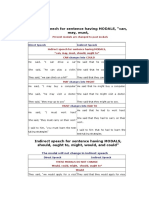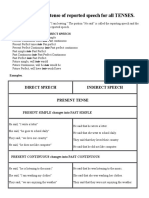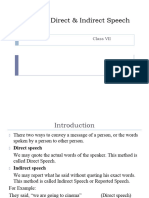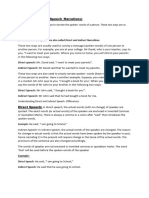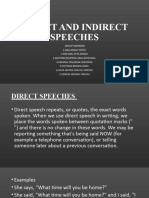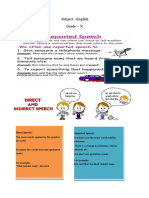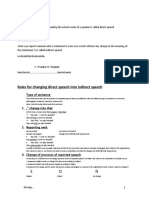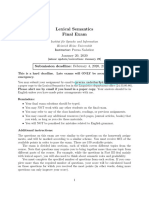Reported Speech
Reported Speech
Uploaded by
Jackie RicoCopyright:
Available Formats
Reported Speech
Reported Speech
Uploaded by
Jackie RicoOriginal Title
Copyright
Available Formats
Share this document
Did you find this document useful?
Is this content inappropriate?
Copyright:
Available Formats
Reported Speech
Reported Speech
Uploaded by
Jackie RicoCopyright:
Available Formats
DIRECT AND INDIRECT SPEECH
INTRODUCTION
There two ways to convey a message of a person, or the words spoken by a person to other
person.
1. Direct speech
2. Indirect speech
Suppose your friend whose name is John tells you in school, “I will give you a pen”. You
come to home and you want to tell your brother what your friend told you. There are two
ways to tell him.
Direct speech: John said, “I will give you a pen”.
Indirect Speech: John said that he would give me a pen.
In direct speech the original words of person are narrated (no change is made) and are
enclosed in quotation mark. While in indirect speech some changes are made in original
words of the person because these words have been uttered in past so the tense
will change accordingly and pronoun may also be changed accordingly.
Reporting verb: The verb first part of sentence (i.e. he said, she said, he says, they said, she
says,) before the statement of a person in sentence is called reporting verb.
Fundamental rules for indirect speech.
1. Reported speech is not enclosed in quotation marks.
2. Use of word “that”: The word “that” is used as a conjunction between the reporting
verb and reported speech.
3. Change in pronoun: The pronoun (subject) of the reported speech
is changed according to the pronoun of reporting verb or object (person) of reporting
verb (first part of sentence). Sometimes the pronoun may not change.
TENSE CHANGE IN INDIRECT SPEECH
Present simple tense into Past simple
Present Continuous tense into Past continuous
Present Perfect tense into Pas perfect
Present Perfect Continuous into Past perfect continuous
Past simple into Past Perfect
Past Continuous into Past Perfect Continuous
Past Perfect into Past Perfect
Future simple, will into would
Future Continuous, will be into would be
Future Perfect, will have into would have
Present modals are changed to past modals: can, may, must
CAN changes into COULD
He said, “I can drive a car” He said that he could drive a car.
MAY changes into MIGHT
He said, “I may buy a computer” He said that he might buy a computer.
MUST changes into HAD TO
He said, “I must work hard” He said that he had to work hard.
Indirect speech for sentence having MODALS, should, ought to, might, would, and could”
These modals do not change.
Would
They said, “we would apply for a visa”
They said that they would apply for visa.
Could
She said, “she could play a piano”
She said that she could play a violin.
Might
He said, “guests might come”
He said that guest might come.
Should
He said, “I should avail the opportunity”
He said that he should avail the opportunity.
Ought to
He said to me, “you ought to wait for him”
He said to me that I ought to wait for him.
CHANGES IN PRONOUN IN INDIRECT SPEECH
The pronoun (subject) of the reported speech is changed according to the pronoun of
reporting verb or object (person) of the reporting verb (first part of sentence).
Direct speech: He said, “I live in New York”
Indirect speech: He said that he lived in New York.
Direct speech: She said to him, “you are intelligent”
Indirect speech: She said to him that he was intelligent.
Direct speech: He said to me, “you are late for the party”
Indirect speech: He said to me that I was late for the party.
Sometimes the pronoun may not change.
Direct speech: They said, “he will come”
Indirect speech: They said that he would come.
Direct speech: You said, “they are waiting for the bus”
Indirect speech: You said that they were waiting for the bus.
CHANGES IN TIME AND ADVERBS IN INDIRECT SPEECH.
Time and adverbs are changed in indirect speech.
Common Rules
Today changes to that day/the same day
Tomorrow changes to the next day/the following day
Yesterday changes to the day before/the previous day
Next week/month/year changes to the following week/month/year
Last week/month/year changes to the previous week/month/year
Now/just changes to then
Ago changes to before
Here changes to there
This changes to that
QUESTIONS WHICH CAN BE ANSWERED IN YES/NO.
To change questions (which can be answered in yes or no) into indirect speech, the word “if”
or “whether” is used before the question in indirect speech. Rules for change in tense
of question sentences are the same as for the change in normal tenses in indirect speech
Direct speech: She said, “Will he participate in the quiz competition?”
Indirect Speech: She asked me if he would participate in quiz competition.
Direct speech: I said to him, “are you feeling well?”
Indirect Speech: I asked him if he was feeling well.
QUESTION WHICH CANNOT BE ANSWERED IN YES/NO.
Direct speech: He said to me, “how are you?”
Indirect speech: He asked me how I was. (Not, how was I)
Direct speech: She said to him, “why did you come late?”
Indirect speech: She asked him why he had come late.
INDIRECT SPEECH OF IMPERATIVE SENTENCE
A sentence which expresses command, request, advice or suggestion is called imperative
sentence.
For example,
• Open the door.
• Please help me.
• Learn your lesson.
To change such sentences into indirect speech, the word “ordered” or “requested” or
“advised” or “suggested” or “forbade” or “not to do” is added to the reporting verbs
depending upon the nature of the imperative sentence.
Direct speech: She said to him, “you should work hard for the exam”
Indirect Speech: She suggested that he should work hard for exam.
Direct speech: The teacher said to the student, “do not waste time”
Indirect Speech: The teacher advised the students not to waste time.
Direct speech: The teacher said to him, “Get out”
Indirect Speech: The teacher ordered him to get out.
INDIRECT SPEECH OF EXCLAMATORY SENTENCES
Sentences which express states of joy or sorrow or wonder are called exclamatory
sentences.
To change such sentences, the words “exclaimed with joy” or “exclaimed with sorrow” or
“exclaimed with wonder” are added to the reporting verb depending upon the nature of
exclamatory sentence.
Examples.
Direct speech: He said, “Hurrah! I won a prize”
Indirect Speech: He exclaimed with joy that he had won a prize.
Direct speech: John said, “Wow! What a nice shirt it is”
Indirect Speech: John exclaimed with wonder that it was a nice shirt.
Direct speech: He said, “Oh no! I missed the train”
Indirect Speech: He exclaimed with sorrow that he had missed the train.
You might also like
- Active and Passive Voice, Conditional Sentence & Reported SpeechDocument22 pagesActive and Passive Voice, Conditional Sentence & Reported SpeechTrịnh Quốc Hiếu100% (1)
- Powder PDFDocument22 pagesPowder PDFAna DevadzeNo ratings yet
- NarrationDocument9 pagesNarrationArun SomanNo ratings yet
- Indirect Speech For Exclamatory and Imperative SentencesDocument8 pagesIndirect Speech For Exclamatory and Imperative SentencesRizwan Bashir50% (2)
- Reported SpeechDocument25 pagesReported Speechmauliksur.marchNo ratings yet
- Direct and Indirect SpeechDocument11 pagesDirect and Indirect SpeechsigiryaNo ratings yet
- Direct and Indirect SpeechDocument10 pagesDirect and Indirect SpeechAdine RachmadinnaNo ratings yet
- Direct & Indirect SpeechDocument8 pagesDirect & Indirect SpeechSecurity Check-upNo ratings yet
- Direct and Indirect SpeechDocument8 pagesDirect and Indirect SpeechsarfarazNo ratings yet
- Direct and Indirect SpeechDocument10 pagesDirect and Indirect SpeechNur Asfiya KhustinaNo ratings yet
- Direct Indirect SpeechDocument14 pagesDirect Indirect SpeechAnis Damayanti100% (1)
- Direct & Indirect RulesDocument6 pagesDirect & Indirect Rulesshikhapranjal58No ratings yet
- Reported SpeechDocument6 pagesReported SpeechWaleed Marouf A. NueiratNo ratings yet
- Reported SpeechDocument34 pagesReported SpeechCary Ortiz100% (3)
- Direct and Reported SpeechDocument23 pagesDirect and Reported Speechphakkaramai2549candyNo ratings yet
- MEETING 10 - 11 REPORTED SPEECH (New)Document25 pagesMEETING 10 - 11 REPORTED SPEECH (New)AiluNo ratings yet
- Direct Indirect SpeachDocument13 pagesDirect Indirect SpeachMalik Naseer AwanNo ratings yet
- Reported Speech For All TensesDocument7 pagesReported Speech For All TensesMirjana PrekovicNo ratings yet
- Indirect Speech For Sentence Having MODALSDocument11 pagesIndirect Speech For Sentence Having MODALSWahyu Wiji PamungkasNo ratings yet
- Direct and Indirect SpeechDocument16 pagesDirect and Indirect SpeechHazratHayatNo ratings yet
- Table For Change in Tense of Reported Speech For All TENSESDocument10 pagesTable For Change in Tense of Reported Speech For All TENSESnavi_khiNo ratings yet
- Direct and Indirect SpeechDocument16 pagesDirect and Indirect SpeechTrinne AnggitaNo ratings yet
- 5-2D4990E11F92.CLASS10-ReportedSpeech2 (1)Document4 pages5-2D4990E11F92.CLASS10-ReportedSpeech2 (1)kashish.bhesaniaNo ratings yet
- Direct Indirect SpeechDocument8 pagesDirect Indirect SpeechMaadhu AvatiNo ratings yet
- Direct and Indirect Speech RulesDocument4 pagesDirect and Indirect Speech RulesMayur MeenaNo ratings yet
- Direct Speech FinalDocument8 pagesDirect Speech FinalMahnoor AkhterNo ratings yet
- Direct Indirect SpeechDocument29 pagesDirect Indirect SpeechRienne BinksNo ratings yet
- Reported SpeechDocument20 pagesReported SpeechLinda Fatmasari100% (1)
- Direct and Indirect SpeechDocument5 pagesDirect and Indirect SpeechRakesh AgarwalNo ratings yet
- Notes - Reported SpeechDocument7 pagesNotes - Reported SpeechzackroiteytNo ratings yet
- Direct and IndirectDocument21 pagesDirect and Indirectgeetaryan01No ratings yet
- Reported Speech Handout Class ViiiDocument6 pagesReported Speech Handout Class Viiidivyanshuaggarwal483No ratings yet
- Indirect Speech Lesson With ExercisesDocument10 pagesIndirect Speech Lesson With Exercisesmohammad515No ratings yet
- TensesDocument19 pagesTenseshyde2520015754100% (1)
- Eng 7 Quarter 4 W4Document4 pagesEng 7 Quarter 4 W4Jan Philip AbellonNo ratings yet
- Direct SpeechDocument9 pagesDirect SpeechMahnoor AkhterNo ratings yet
- Direct and Indirect Speech RulesDocument6 pagesDirect and Indirect Speech RulesRubab QamerNo ratings yet
- Direct and Indirect SpeechDocument27 pagesDirect and Indirect SpeechdonkeyshotdoflamingoNo ratings yet
- Direct Indirect SpeechDocument29 pagesDirect Indirect SpeechMuhammad Saud SaeedNo ratings yet
- Tri WahyuniDocument16 pagesTri WahyuniDiana CarolinaNo ratings yet
- Reported StatementDocument5 pagesReported Statementousmanebaby755No ratings yet
- (Reported) Direct & Indirect SpeechDocument5 pages(Reported) Direct & Indirect SpeechAngelica Mccoy100% (2)
- Direct-Indirect SpeechDocument16 pagesDirect-Indirect SpeechWiranadi RamdhaniNo ratings yet
- Eng GrammarDocument16 pagesEng GrammarChristine LlantoNo ratings yet
- Direct Indirect NarrationDocument6 pagesDirect Indirect NarrationjurassicworldplayerxNo ratings yet
- Direct and Indirect NarrationDocument9 pagesDirect and Indirect NarrationKamran KhanNo ratings yet
- Direct & IndirectDocument13 pagesDirect & Indirectmrkaif7295No ratings yet
- Direct and Indirect SpeechDocument10 pagesDirect and Indirect SpeechJohann Alwi Candyn'machineloverNo ratings yet
- Lecture#6 (Narration)Document21 pagesLecture#6 (Narration)luqmanqadir0809No ratings yet
- Direct and Indirect Speeches EnglishDocument24 pagesDirect and Indirect Speeches EnglishmawufemorNo ratings yet
- Direct and Indirect Speech RulesDocument9 pagesDirect and Indirect Speech RulesJCTC jahanianNo ratings yet
- Reported Speech Grade 10Document14 pagesReported Speech Grade 10SeemaVadehraNo ratings yet
- Direct and Indirect SpeechDocument3 pagesDirect and Indirect SpeechRegine Rivera0% (1)
- Reported Speech Grammar 0Document5 pagesReported Speech Grammar 0Katita VieraNo ratings yet
- Direct and Indirect SpeechDocument7 pagesDirect and Indirect SpeechDivya Rai SharmaNo ratings yet
- Direct and Indirect Speech in English GrammarDocument5 pagesDirect and Indirect Speech in English Grammarradhikachopda239No ratings yet
- Direct and Indirect Speech RulesDocument7 pagesDirect and Indirect Speech RulesUmme ShifaNo ratings yet
- Direct and Indirect SpeechDocument35 pagesDirect and Indirect SpeechSannie MiguelNo ratings yet
- Reported Speech (Indirect Speech) What Is Reported Speech?: A. Reporting StatementsDocument6 pagesReported Speech (Indirect Speech) What Is Reported Speech?: A. Reporting Statementsriaadria100% (2)
- Tense Changes When Using Reported Speech GrammarDocument11 pagesTense Changes When Using Reported Speech GrammarDenzel Guden Bautista MolloNo ratings yet
- Direct speech-WPS OfficeDocument6 pagesDirect speech-WPS OfficeAshiq Superior collegeNo ratings yet
- Say What You Mean!: Move up the Social and Business Ladder--One Perfect Word After Another.From EverandSay What You Mean!: Move up the Social and Business Ladder--One Perfect Word After Another.No ratings yet
- Quo Vadis Final Test Paper: Intermediate ADocument4 pagesQuo Vadis Final Test Paper: Intermediate AJohny CojocariNo ratings yet
- 9th English and Urdu Tests 21-22 by Bismillah Academy 0300-7980055Document13 pages9th English and Urdu Tests 21-22 by Bismillah Academy 0300-7980055Assam KhanNo ratings yet
- Keep It Real A1+ SB (Units 6 - 9)Document86 pagesKeep It Real A1+ SB (Units 6 - 9)Facu MercadoNo ratings yet
- CAE at A Glance (Overview + Resources) 2Document1 pageCAE at A Glance (Overview + Resources) 2auroracamstraNo ratings yet
- Phrasal Verbs List: Verb Meaning Example Ask Someone Out Ask AroundDocument12 pagesPhrasal Verbs List: Verb Meaning Example Ask Someone Out Ask AroundAlessandro ManottiNo ratings yet
- 1a. Unreal Situation PPT 1st MeetDocument16 pages1a. Unreal Situation PPT 1st MeetUqy TalisNo ratings yet
- Transformation of SentencesDocument9 pagesTransformation of Sentenceshunt1982100% (1)
- SB Unit5Document1 pageSB Unit5NguyenThiPhuongThuyNo ratings yet
- Word Formation Parts of Speech: María Guadalupe GarcíaDocument29 pagesWord Formation Parts of Speech: María Guadalupe GarcíaAmelia OspinoNo ratings yet
- Nominalisation and ParaphrasingDocument0 pagesNominalisation and ParaphrasingEssien PopoolaNo ratings yet
- 29.02.24. 6Г 40мин. present perfect affirmative and negativeDocument3 pages29.02.24. 6Г 40мин. present perfect affirmative and negativeТоғжан МейранбекNo ratings yet
- English-Vertical-Progression-With-Oral CommunicationDocument14 pagesEnglish-Vertical-Progression-With-Oral CommunicationAndrew C. BrazaNo ratings yet
- Ls1-Com. Skills EnglishDocument3 pagesLs1-Com. Skills EnglishPATERNO DARIANo ratings yet
- B - Rosetta Stone English Contents - ProgramaDocument11 pagesB - Rosetta Stone English Contents - ProgramapiacabreraNo ratings yet
- NT MariaDocument68 pagesNT Mariamaria antonyNo ratings yet
- Sentence PatternsDocument22 pagesSentence PatternsUhudhu AhmedNo ratings yet
- Lexicology As A Linguistic ScienceDocument60 pagesLexicology As A Linguistic Scienceapi-282003682No ratings yet
- Topic 2 Lesson 3Document34 pagesTopic 2 Lesson 3RKL KhairulNo ratings yet
- 2 Bac Humour Grammar ModalsDocument2 pages2 Bac Humour Grammar ModalsKaoutar Jadir100% (1)
- 1b. Irregular Verb List - Meva and TestsDocument16 pages1b. Irregular Verb List - Meva and TestsGemmaNo ratings yet
- Confused Words PDFDocument5 pagesConfused Words PDFkasuri123No ratings yet
- Lexical Semantics Final Exam: January 20, 2020Document7 pagesLexical Semantics Final Exam: January 20, 2020Tâm Đỗ Hoàng ThanhNo ratings yet
- Golden Rules For Sentence Correction PDF Download 2Document11 pagesGolden Rules For Sentence Correction PDF Download 2laldingngheta96No ratings yet
- CAE Advanced CourseDocument7 pagesCAE Advanced CourseJTuretzkyNo ratings yet
- Self EfficiacnyDocument12 pagesSelf Efficiacnykamranjamil717No ratings yet
- Part of Speech Grade 5Document8 pagesPart of Speech Grade 5Saulus Saulus100% (1)
- Copy of Verbs For Google DriveDocument15 pagesCopy of Verbs For Google Driveapi-544090712No ratings yet
- A Humanistic Approach To ErrorsDocument44 pagesA Humanistic Approach To ErrorsAnonymous tc7XPINo ratings yet


















